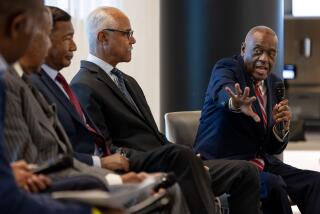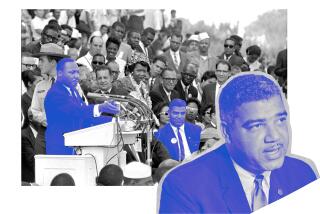Rockwell Exec Sees a Different Black Role Model : Leadership: Earl Washington, a top African-American businessman, believes that sports stars and entertainers get too much attention.
- Share via
Earl Washington bristles at the mention of the people most widely regarded as today’s black heroes.
Shifting slightly in a chair in his spacious office at Rockwell International Corp.’s Defense Electronics organization in Anaheim, Washington explains why.
He too admires popular sports stars and entertainers, Washington says.
“But they aren’t the ultimate role models that our youth should be concentrating on,” says Washington, vice president of strategic management for the $2-billion Rockwell unit, which produces everything from anti-submarine warfare systems to ICBMs.
“There are people that are doing some fantastic things in this world who have a heck of a lot more influence on their lives. If you want to look for a book of (black) heroes,” he says, pointing toward his coffee table, “I think that book is a much better book right there.”
Washington is referring to the February issue of Black Enterprise magazine, in which he is profiled as one of the “40 Most Powerful Black Executives” in corporate America.
The South-Central Los Angeles native is one of three executives from Southland companies on the list, which is made up of senior managers of publicly traded firms. The others are both executives of Walt Disney Co.: Dennis F. Hightower, president of Disney consumer products, and Richard D. Nanula, chief financial officer.
According to Black Enterprise, blacks hold 5.1% of all management jobs in U.S. corporations, with black women holding just under half of those positions. African-Americans make up 12.1% of the total U.S. population.
Washington, 48, also serves as vice president of Rockwell’s transportation systems division, one of the main subcontractors on the Metro Green Line transit project.
But it is through his work as president of the Executive Leadership Council, a group of about 100 black executives, that Washington is trying to make a difference in the shape of tomorrow’s black leaders.
“I am part of the first group of African-American executives who have been trained by the system,” he says. “But when you look behind you and see who is coming along in that management pipeline, the pipeline is getting thinner and thinner. We need to do something about that.”
Growing up in the inner-city, Washington didn’t have heroes. He admits that he never had a clear career path in mind, either--only a sense that his parents expected him to accomplish more than his father, who was a press operator at Jeffries Banknote Co. in downtown Los Angeles.
Washington got his start as a part-time technical illustrator in Glendale at Librascope, then a division of Singer Co., while finishing his degree at Cal State Los Angeles. There, his ambition found first light. He hounded Robert Vaughan, then vice president of marketing, for a chance to meet and discuss job prospects.
Washington’s persistence impressed Vaughan, who offered him a marketing job. “He definitely was an ambitious young man who wanted to do more than sit behind a desk and draw pictures all day,” Vaughan recalled.
A defense-related layoff sent Washington to Rockwell, where his willingness to be relocated to assignments in Dallas and Canada helped speed his corporate advance.
A self-described “regular kind of guy,” Washington worries about losing himself in all the visibility. He is decidedly down-to-earth; he enjoys watching Formula One racing and craves hamburgers after a business trip filled with executive fare. His wife of 27 years, Brenda, is the same woman he took to the Fremont High School prom.
He considers his listing by New York-based Black Enterprise both a “boon and a burden.”
“When you are in a very visible position, there are jealousies that can crop up,” Washington said. “That’s the downside.”
More to Read
Inside the business of entertainment
The Wide Shot brings you news, analysis and insights on everything from streaming wars to production — and what it all means for the future.
You may occasionally receive promotional content from the Los Angeles Times.










